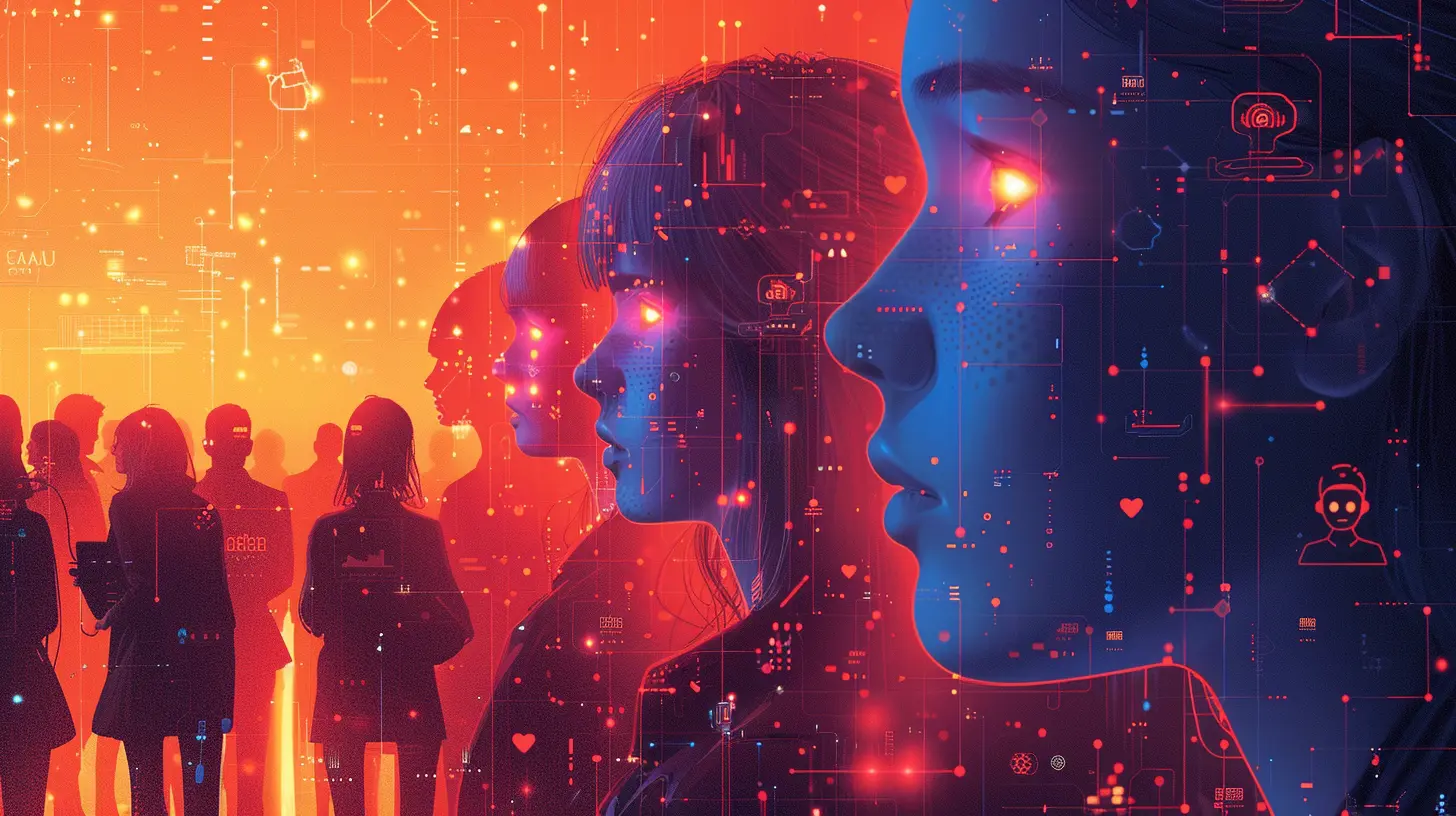The Ethics of AI in Social Media: Amplifying Voices or Silencing Dissent?
1 August 2025
Artificial Intelligence (AI) is no longer the stuff of sci-fi movies or tech conferences; it's right here, shaping the very platforms we use every day. If you’re scrolling through your favorite social media app, chances are, there’s an AI working behind the scenes—deciding what you see, what you don't, and maybe even what you think.
But here’s the million-dollar question: Is AI making social media better by amplifying diverse voices, or is it suppressing opinions that don’t fit certain narratives? It's a question worth exploring, especially given how much time we spend on these platforms. So, let's dive into the ethics of AI in social media and figure out whether it's empowering us—or controlling us.

What is AI’s Role in Social Media?
Before we jump into the ethics, let’s take a quick detour to understand how AI is used on social media platforms like Facebook, Twitter, and Instagram. AI is like the wizard behind the curtain—pulling strings, making decisions, and influencing what we see.Content Curation
Ever noticed how your feed seems tailored to your interests? That’s AI at work. By analyzing your past interactions, likes, shares, and comments, AI curates your feed to show you content that it thinks will keep you engaged. It’s like having a personalized newspaper that updates in real-time. But here’s the kicker—AI isn’t just showing you what you like; it’s also filtering out what you don’t like or, worse, what it thinks you won’t like.Moderation and Enforcement
AI is used for moderating content, too. With the sheer volume of posts, videos, and comments shared every second, it’s impossible for human moderators to catch everything. So, AI steps in to flag or remove content that violates community guidelines. This includes hate speech, misinformation, or violent content. But, as we’ll discuss later, this AI moderation raises some ethical red flags.Recommendations
The recommended accounts, friends, or topics you see? Yep, that’s AI making educated guesses about who and what you might be interested in. It's supposed to make life easier, but it also means AI is subtly guiding your interactions and online relationships.
The Ethical Dilemma: Amplifying Voices or Silencing Dissent?
Now that we know what AI is up to, let's talk ethics. The central question here is whether these AI-driven systems are helping to amplify a variety of voices or if they're unintentionally—or perhaps intentionally—silencing certain perspectives.Amplifying Voices: The Upside
In theory, AI can be a force for good, especially when it comes to amplifying marginalized voices. For example, algorithms can help surface content from underrepresented groups or minority creators that might otherwise get lost in the sea of posts. This is important because, historically, mainstream media has often failed to give a platform to diverse voices.AI can break down these barriers by promoting content based on engagement metrics, not on who the creator is. This allows for a more democratic distribution of content where anyone—regardless of their background—can have their voice heard if what they're sharing resonates with an audience.
Moreover, AI can help foster safe online environments by filtering out harmful content like hate speech and harassment. In doing so, AI helps amplify voices that might otherwise be drowned out by trolls and bullies. It’s like having a bouncer at the door of a party, making sure everyone inside can have a good time without fear of being harassed.
Silencing Dissent: The Downside
However, the flip side of this argument is that AI can also be used to silence dissenting opinions, often in ways that aren’t immediately obvious. Let’s take content moderation as an example. AI isn’t perfect—it can misinterpret irony, satire, or even cultural nuances. This means that legitimate criticism or dissenting opinions might be flagged as inappropriate, leading to their removal.In some cases, entire political movements or ideologies might be suppressed because the AI wrongly categorizes them as harmful. For example, during politically charged times, social media platforms have been accused of suppressing content that goes against mainstream narratives. Whether this is a flaw in the AI or a result of biased training data, the outcome is the same: certain voices get silenced.
Even more concerning is the fact that AI algorithms are designed to prioritize content that keeps you engaged—usually meaning content that you agree with. This creates echo chambers where you’re only exposed to ideas that align with your existing beliefs, while dissenting opinions are pushed to the margins. It’s like being trapped in a bubble where everyone agrees with you, but you never get to see the bigger picture.

Bias in AI: A Silent Manipulator
AI is only as good as the data it’s trained on, and if that data is biased, the AI will be biased too. This is one of the most significant ethical concerns when it comes to AI in social media. If the training data reflects societal biases—whether in terms of race, gender, or political ideology—the AI will perpetuate those biases.For example, if an AI is trained on data that underrepresents women or people of color, it might fail to amplify their voices on social media. Similarly, if the training data leans towards one political viewpoint, the AI might suppress content from the opposing side.
This bias can be subconscious and unintentional, but that doesn’t make it any less harmful. In fact, because AI operates behind the scenes, these biases can be even harder to spot and correct. It's like having a silent manipulator subtly influencing what you see and think, all without you even realizing it.

The Impact on Free Speech
One of the core values of social media is its role as a platform for free speech. But with AI moderating content and deciding what gets amplified, are we at risk of losing that freedom?Over-Moderation
One issue is over-moderation, where AI is too quick to remove content that it deems inappropriate. This can lead to the suppression of legitimate speech, particularly when it comes to controversial or politically sensitive topics. For example, activists or whistleblowers might have their content removed because the AI mistakes it for harmful content.Self-Censorship
Even more concerning is the possibility that people might start to self-censor because they fear their content will be flagged or removed. If users know that AI is watching their every post, they might avoid sharing anything that could be perceived as controversial. This creates a chilling effect where people are less likely to speak out, even when they have valid concerns or criticisms.Can We Fix It? Potential Solutions
So, what can be done to address these ethical concerns? While there’s no silver bullet, there are a few potential solutions that could help strike a balance between amplifying voices and protecting free speech.More Transparency
One of the biggest issues with AI in social media is the lack of transparency. Users don’t really know how these algorithms work or why certain content gets promoted while other content is suppressed. By making these algorithms more transparent, social media platforms could give users more control over what they see and help build trust.Human Oversight
AI can’t do it all—at least not yet. Human oversight is crucial, especially when it comes to moderating content. Instead of relying solely on AI to flag or remove content, social media platforms could use a hybrid approach where humans review flagged content before it’s removed. This would help reduce the risk of AI making mistakes and ensure that legitimate voices aren’t silenced.Bias Audits
To address the issue of bias in AI, social media platforms could conduct regular audits of their algorithms to identify and correct any biases. This could involve reviewing the training data to ensure it’s representative of a diverse range of voices and perspectives.Empowering Users
Finally, giving users more control over their own feeds could help mitigate some of the ethical concerns surrounding AI. For example, platforms could allow users to customize their feed algorithms, deciding for themselves what kind of content they want to see. This would give users more agency and reduce the power that AI has over their online experience.
Final Thoughts
The ethics of AI in social media is a complex issue, with no easy answers. On one hand, AI has the potential to amplify diverse voices and create safer online spaces. On the other hand, it can also silence dissent, perpetuate bias, and limit free speech.As AI continues to play an increasingly important role in our digital lives, it’s crucial that we remain vigilant about its impact on society. After all, social media was supposed to give us a voice, not take it away. So, the next time you’re scrolling through your feed, take a moment to think about the AI behind the scenes—and whether it’s really working in your favor.
all images in this post were generated using AI tools
Category:
Ai EthicsAuthor:

Ugo Coleman
Discussion
rate this article
1 comments
Sylas McNab
AI's impact on voice reveals society's moral compass and priorities.
August 3, 2025 at 11:27 AM

Ugo Coleman
I appreciate your insight! AI indeed reflects societal values, shaping which voices are amplified or silenced, highlighting the need for ethical considerations in its application.


